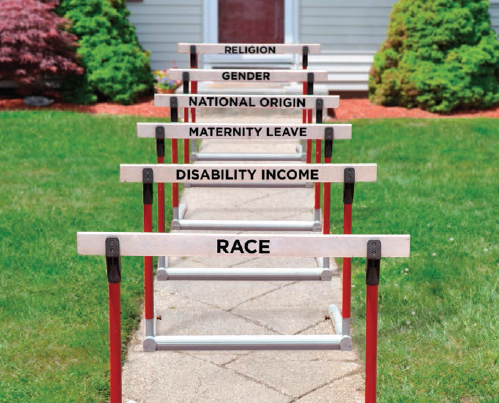
Fair Housing Act
The Fair Housing Act (and amendments) makes it illegal to discriminate in the buying, selling or renting of a home because of a person’s race, color, national origin, religion, sex, familial status and disability. Familial status includes children under the age of 18 living with parents or legal custodians, pregnant women and people securing custody of children under the age of 18.
Follow this link to learn more about your legal rights and Fair Housing from the Department of Housing & Urban Development (HUD).
Examples of Discrimination under the Fair Housing Act
The following are possible examples of discrimination if they occur based on membership in a protected class (race, color, national origin, religion, sex/gender, familial status or a disability):
- Refusing to sell, rent or lease housing to an interested tenant or buyer
- Applying different sale, rental or occupancy terms for different people
- Lying about or misrepresenting the availability of housing when housing is in fact available
- Providing inferior conditions, terms, facilities or privileges in connection with housing
- “Blockbusting” or encouraging people to leave an area based on their protected class
- Refusing to permit reasonable modifications when accommodations may be necessary for a person to use and enjoy their dwelling
- Steering customers to a certain neighborhood, refusing to serve certain customers by real estate professionals
- Redlining or limiting lending in a particular area because of the demographics of that area or imposing different terms or conditions on a loan
- Harassing tenants and homeowners in connection with housing accommodations
- Zoning laws that have an unfair effect on protected classes
Click here for more information about discrimination and filing complaints.
Other Civils Rights legislation and rulemaking related to fair housing

The Civil Rights Act of 1968, more popularly known as the “Fair Housing Act,” was passed with bi-partisan support from Congress and signed into law by President Johnson on April 11, 1968.
In addition to the Fair Housing Act, other laws and important guidance related to fair housing include the following (select the links to learn more):
- Final Guidance to Federal Financial Assistance Recipients Regarding Title VI Prohibition Against National Origin Discrimination Affecting Limited English Proficient Persons (Federal Register/ Vol. 72, No. 13 / January 22, 2007 /Notices)
Consolidated Planning & Fair Housing
The State of Tennessee, as a recipient of federal block grant funds, is required to take meaningful action to further fair housing choice. The Department of Housing and Urban Development (HUD) requires that states and localities that receive community planning and development block grant funding assess the affordable housing and community development needs within their jurisdiction and establish priorities through a Consolidated Plan. THDA serves as the lead agency working collaboratively with other state agencies that are recipients of HUD block grants, the Department of Economic and Community Development (ECD) and the Department of Health (TDOH), to engage in consolidated planning every five years.
A formal assessment of potential impediments to fair housing choice is completed as part of the Consolidated Planning process. This assessment informs the development of a Fair Housing Plan with actions and strategies to eliminate or reduce the negative effects of the impediments. The Fair Housing Plan is a component of the State of Tennessee 2020-2024 Consolidated Plan.
